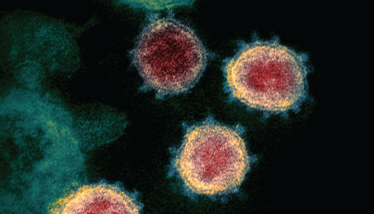Pharma Versus Omicron
How will vaccine and therapeutic makers respond to the new SARS-CoV-2 variant?

Credit: NIAID/flickr.com
The B.1.1.529 variant – Omicron – has been designated by the WHO as a “variant of concern.” With all the media hype and plenty of scaremongering, it can be difficult to discern the true facts, so we’ve curated a few links to primary sources to help you understand what’s going on with the variant – and what pharma companies are doing about it.
Firstly, here’s the latest statement from the WHO on Omicron. In a nutshell, it does have several mutations, but it’s not yet clear if it is more transmissible than other variants or if it causes more severe disease. We also don’t know for sure if current vaccines will be affected.
Moderna has issued a statement that lays out its strategy – involving boosters – to address the variant. In the statement, Stéphane Bancel says, “We have three lines of defense that we are advancing in parallel: we have already evaluated a higher dose booster of mRNA-1273 (100 µg), second, we are already studying two multi-valent booster candidates in the clinic that were designed to anticipate mutations such as those that have emerged in the Omicron variant and data is expected in the coming weeks, and third, we are rapidly advancing a Omicron-specific booster candidate (mRNA-1273.529).”
Bancel has also spoken with various media outlets, explaining that the variant could be more infectious than the Delta variant, and that there could be a drop in vaccine efficiency due to the large number of mutations. However, more data is needed to be sure.
J&J has shared an official statement; it is evaluating how well its vaccine fares against the variant but also pursuing an Omicron-specific variant vaccine.
Meanwhile, Regneron is looking hard at its approved REGN-COV cocktail (casirivimab and imdevimab) to see if its efficacy will be affected by Omicron. Their statement says, “To date, there have been no direct data testing the Omicron variant’s resistance to vaccine induced and monoclonal antibody-conveyed immunity. Prior in vitro analyses and structural modeling regarding the individual mutations present in the Omicron variant indicate that there may be reduced neutralization activity of both vaccine-induced and monoclonal antibody conveyed immunity, including the current REGEN-COV antibodies. Further analyses are ongoing to confirm and quantify this potential impact using the actual Omicron variant sequence.”
At the time of writing, Pfizer, BioNTech, and AstraZeneca did not have statements on their websites. However, Pfizer’s CEO, Albert Bourla, has spoken to media outlets in short interviews. He says that the Omicron variant “definitely has the characteristics” to create “concerns” but he is also feeling confident and we should know more in the coming weeks. He also added that it is “extremely unlikely” that the current vaccines would offer no protection. For Pfizer’s new antiviral pill, he says he doesn’t believe there will be any drop in efficacy.

Making great scientific magazines isn’t just about delivering knowledge and high quality content; it’s also about packaging these in the right words to ensure that someone is truly inspired by a topic. My passion is ensuring that our authors’ expertise is presented as a seamless and enjoyable reading experience, whether in print, in digital or on social media. I’ve spent fourteen years writing and editing features for scientific and manufacturing publications, and in making this content engaging and accessible without sacrificing its scientific integrity. There is nothing better than a magazine with great content that feels great to read.



















